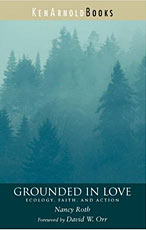Nancy Roth is an Episcopal priest, retreat leader, author, dancer, and musician. In her introduction to this paperback, she quotes President Jimmy Carter who in 1977 warned the American people that the nation's energy habits could lead to troubles down the road: "We must not be selfish or timid if we hope to have a decent world for our children and grandchildren." Sadly his words and long-term thinking were not taken seriously in Washington, D.C. or by the public. We are now reaping the consequences with global warming and an environment under stress. Roth wrote this book after sitting as an adult student in two environmental studies courses at Oberlin College. She hopes that it will be make a difference in the lives of her two grandchildren.
Grounded in Love is divided into five sections: Love, Concern, Ethics, Action, and Hope. Each brief chapter concludes with "Ponder and Pray" containing practical spiritual exercises. Roth writes: "Our relationship with nature and with God will shape our understanding of the world, inform our prayer, vitalize our action, and also help us discern our values." She suggests that loving the Creation is a sacramental response to the many gifts we have received. In this light, recycling newspapers is an act of worship.
The environmental problems we face are so staggering that it is hard to overcome the stumbling blocks standing in the way of our changing our habits: apathy, fear, the desire to avoid inconvenience, and the feeling of being overwhelmed. But we can start with opening our hearts. The ecological crisis of our time engenders within us a sense of mourning for the many losses in the natural world. Roth writes:
"I discover grief welling up when I read about the last members of an endangered species, mountain valleys threatened by a new dam, or a melting icecap. I want to cover my eyes when we drive east on a route through coal-mining country and pass scenery desecrated by strip mining, or when I see from the window of an airplane that even uglier method of coal mining called mountain-top removal."
Roth challenges us to reframe the Ten Commandments and see them as "a series of guideposts to help us respond to today's particular call to love God and our neighbor." For example, in her discussion of "You shall not murder," she points to endangered species and then advises us to include threatened animals and plants in our prayers. Other ways of putting faith into action is doing an energy audit for your home or church, using public transportation if possible, buying food from a local farmer's market, recycling, turning off lights, and getting rid of cleaning products containing toxic chemicals.
Roth suggests that we nurture hope by reading the Scriptures, heeding the wise counsel of mystics, pondering the everyday spirituality of the Celts, practicing contemplative prayer, and learning about the natural world from artists and other creative individuals. The author concludes Grounded in Love with a meditation based on the Shakers song and dance "Simple Gifts."
